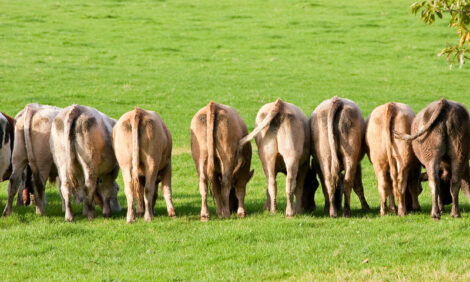



Cow Scans Highlight Advantage AI Issues
IRELAND - The National Cattle Breeding Centre (NCBC) has been left red-faced by the failure of a large amount of their Female Advantage semen to deliver on its promise of extra female calves for farmers.According to the The Irish Independent, preliminary scanning results suggest that up to 40,000 of the specially treated straws sold to farmers at a premium last spring have failed to deliver any bias whatsoever towards female calves.
This is based on an NCBC estimate that up to 40pc of the 100,000 Advantage straws that it sold this year were processed incorrectly. The straws were sold by both Progressive Genetics and Munster AI, who are joint shareholders in NCBC.
It has emerged that a decision to short-circuit the process required to analyse the semen was the cause of problem. As a result, much of the Advantage semen sold to farmers after an unspecified date last spring did not deliver any extra female calves compared to the national average.
Thousands of farmers will now have a legitimate cause for complaint after shelling out an estimated €240,000 premium for the Advantage semen.
The Advantage semen project is a three-year-old joint venture between NCBC and Boston-based company Arex Life Sciences.
It is estimated that over 100,000 Advantage semen straws from 28 of Ireland's highest-ranking bulls were sold across the country last spring.
At a premium of €6 over untreated straws, the product netted both Progressive Genetics and Munster AI over €500,000 in extra sales revenues.
A sample of more than 400 cows inseminated with the specially treated straws were scanned nearly two months ago. Initial results show that almost 60pc of the cows were carrying pregnancies that displayed a female bias.
These pregnancies corresponded to cows that were inseminated with the semen that was properly analysed.
However, the remainder of pregnancies showed a ratio of female to male calves similar to the national average. These pregnancies corresponded to cows that were inseminated with the semen that was not analysed according to the original guidelines.
NCBC refused to confirm the bulls most affected by the botched analysis but it is believed that the female bias of the pregnancies to six individual bulls was seriously affected.
Bernard Eivers, chief executive of the NCBC, told The Irish Independent that time and cost pressures came on the process required for analysing the semen with the patented technology.
In an attempt to reduce the pressure on limited lab resources at NCBC, a decision was taken to cut out one of the four steps involved in the analysis of the semen during the processing phase.
"We were just trying to speed up the process," said Mr Eivers.
NCBC has already invested huge resources into the Advantage semen project. Extra staff were hired for laboratory work and tens of thousands of euro have been spent on specialised flow cytometers and microscopes.
However, the NCBC boss is adamant that the Advantage semen project should continue. "I hope the board [of NCBC] don't pull the plug on this because I believe it will be ultimately Irish farmers who will lose out most [if they do]," said Mr Eivers.
He also stressed that the Advantage semen had not affected conception rates in the herds where it was used.
"Some farmers are going to be disappointed [with these results] but they can't claim we've affected their levels of fertility," said Mr Eivers.
Dr Barb Cohen of Arex Life Sciences pointed out that process has already resulted in birth of more heifers in previous trials and "with further development, will prove even more effective as more heifers drop each year and the aggregate advantage is realised".
TheCattleSite News Desk


